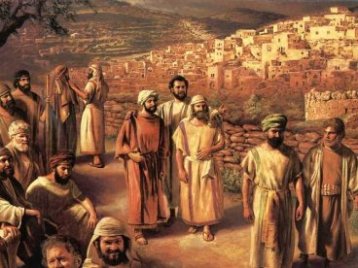The Epistle of Mathetes to Diognetus is an example of early Christian apologetics, writings defending Christianity from its accusers. The Greek writer and recipient are not otherwise known; estimates of dating based on the language and other textual evidence have ranged from AD 130 (which would make it one of the earliest examples of apologetic literature), to the late 2nd century, with the latter often preferred in modern scholarship. “Mathetes” is not a proper name; it simply means “a disciple.”
I remember working on this specific excerpt (posted below) a couple of years ago in Greek class. I regard it as a beautiful description of Christians and the Christian life. It was written to correct many misconceptions and false allegations about Christians and Christian living in the 2nd century. If you’ve never read the Epistle to Diognetus, I’m sure you’ll enjoy this:
“CHAPTER 5
For Christians are not distinguished from the rest of mankind either in locality or in speech or in customs. For they dwell not somewhere in cities of their own, neither do they use some different language, nor practise an extraordinary kind of life. Nor again do they possess any invention discovered by any intelligence or study of ingenious men, nor are they masters of any human dogma as some are. But while they dwell in cities of Greeks and barbarians as the lot of each is cast, and follow the native customs in dress and food and the other arrangements of life, yet the constitution of their own citizenship, which they set forth, is marvellous, and confessedly contradicts expectation. They dwell in their own countries, but only as sojourners; they bear their share in all things as citizens, and they endure all hardships as strangers. Every foreign country is a fatherland to them, and every fatherland is foreign. They marry like all other men and they beget children; but they do not cast away their offspring. They have their meals in common, but not their wives. They find themselves in the flesh, and yet they live not after the flesh. Their existence is on earth, but their citizenship is in heaven. They obey the established laws, and they surpass the laws in their own lives. They love all men, and they are persecuted by all. They are ignored, and yet they are condemned. They are put to death, and yet they are endued with life. They are in beggary, and yet they make many rich. They are in want of all things, and yet they abound in all things. They are dishonoured, and yet they are glorified in their dishonour. They are evil spoken of, and yet they are vindicated. They are reviled, and they bless; they are insulted, and they respect. Doing good they are punished as evil-doers; being punished they rejoice, as if they were thereby quickened by life. War is waged against them as aliens by the Jews, and persecution is carried on against them by the Greeks, and yet those that hate them cannot tell the reason of their hostility.
CHAPTER 6
In a word, what the soul is in a body, this the Christians are in the world. The soul is spread through all the members of the body, and Christians through the divers cities of the world. The soul hath its abode in the body, and yet it is not of the body. So Christians have their abode in the world, and yet they are not of the world. The soul which is invisible is guarded in the body which is visible: so Christians are recognised as being in the world, and yet their religion remaineth invisible. The flesh hateth the soul and wageth war with it, though it receiveth no wrong, because it is forbidden to indulge in pleasures; so the world hateth Christians, though it receiveth no wrong from them, because they set themselves against its pleasures. The soul loveth the flesh which hateth it, and the members: so Christians love those that hate them. The soul is enclosed in the body, and yet itself holdeth the body together; so Christians are kept in the world as in a prison-house, and yet they themselves hold the world together. The soul though itself immortal dwelleth in a mortal tabernacle; so Christians sojourn amidst perishable things, while they look for the imperishability which is in the heavens. The soul when hardly treated in the matter of meats and drinks is improved; and so Christians when punished increase more and more daily. So great is the office for which God hath appointed them, and which it is not lawful for them to decline.”
– Epistle to Diognetus (2nd century), v-vi.

